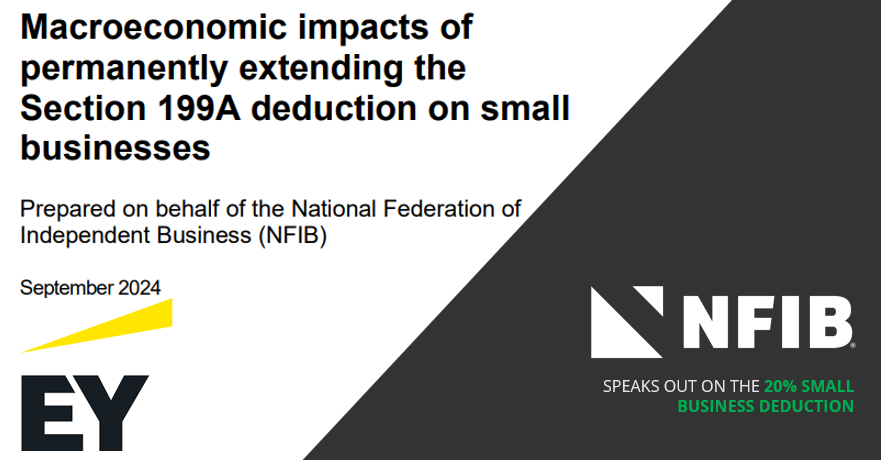Reports highlight the damage to the economy if Congress lets Section 199A of the tax code lapse
FOR IMMEDIATE RELEASE
Contact: Anthony Smith, NFIB Oregon State Director, [email protected]
or Tony Malandra, Senior Media Manager, [email protected]
SALEM, Ore., Sept. 16, 2024—Two reports issued late last week, one with state-specific data, highlight the economic damage that will ensue if Congress lets the 20% Small Business Deduction expire next year.
“Both reports should eliminate whatever lingering doubts Congress has about the paramount importance of making the 20% Small Business Deduction permanent and not letting it lapse at the end of 2025,” said Anthony Smith, Oregon state director for NFIB, which last Thursday released its 2024 NFIB Tax Survey and another report in conjunction with EY (Ernst & Young).
“The EY report had some Oregon-specific numbers on the jobs and GDP to be gained by making the 20% Small Business Deduction permanent,” said Smith, “and our report detailed some of the steps small business owners will take if it is allowed to expire.”
According to EY, “The tax change is estimated to increase US job equivalents at small businesses by approximately 1.2 million jobs, on average, in each of the first ten years and growing over time to 2.4 million each year after that.” On the gross domestic product, “permanently extending the Section 199A deduction is estimated to increase US GDP at small business by $75 billion annually, over the first 10 years; and growing over time to $150 billion annually each year thereafter.”
The Oregon share of those two calculations (Page 7, Page 9) are 18,000 jobs $986 million each year for the first 10 years and 35,000 jobs $2 billion each year after 2035.
NFIB’s Tax Survey found that should Small Business Deduction expire, 61% plan to raise prices, 44% will postpone or cancel capital investments, 36% will postpone or cancel hiring additional employees, 16% will freeze wages or reduce employee benefits, 10% will become more productive , more efficient, and the remaining would take a variety of other actions. (Page 7)
Also last Thursday, Jeff Brabant, NFIB’s vice president of Federal Government Relations, testified before the Senate Committee on Finance, chaired by Oregon Sen. Ron Wyden, and concluded his remarks with, “Members of Congress should ask themselves if they really believe it when they say, ‘small businesses are the backbone of America.’ If they truly believe that statement and value small businesses in their communities, then making the 20% small business deduction permanent should be an easy decision.”
The typical NFIB member employs between one and nine people and reports gross sales of about $500,000 a year. NFIB’s latest Small Business Economic Trends report can be read here and its latest Jobs Report here.
Keep up with the latest Oregon small-business news at www.nfib.com/OR. Follow us on X at @NFIB_OR.
###
For 80 years, NFIB has been advocating on behalf of America’s small and independent business owners, both in Washington, D.C., and in all 50 state capitals. NFIB is a nonprofit, nonpartisan, and member-driven association. Since our founding in 1943, NFIB has been exclusively dedicated to small and independent businesses and remains so today. For more information, please visit nfib.com.
National Federation of Independent Business Oregon
1149 Court Street NE
Salem, OR 97301
503-364-4450
www.nfib.com/oregon
Twitter: NFIB_OR

